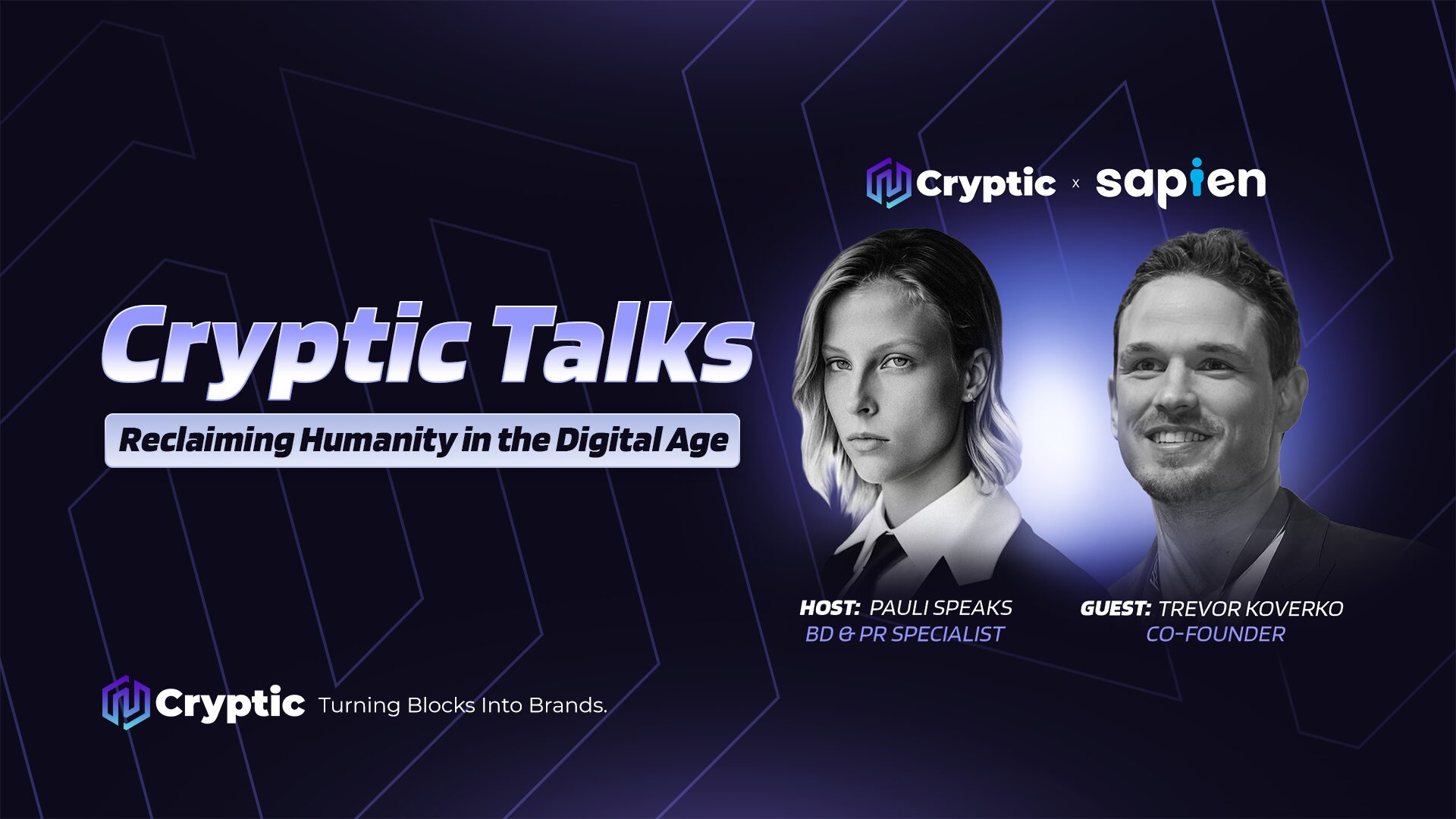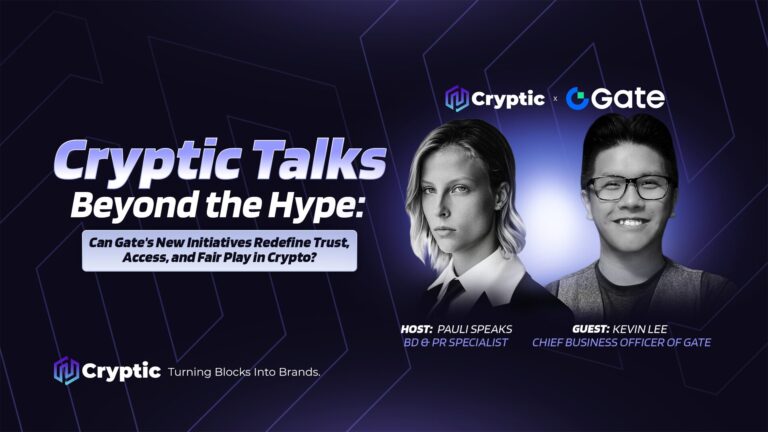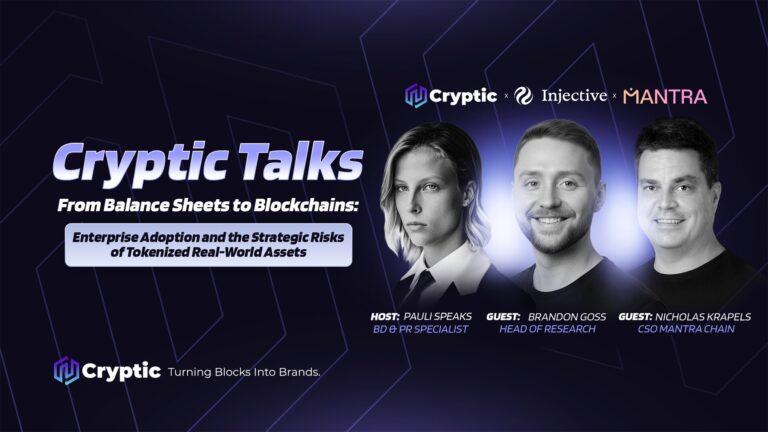In the latest episode of Cryptic Talks, we welcomed Trevor Koverko, co-founder of Sapien and the visionary behind Polymath, along with Ben, Sapien’s head of platform partnerships. The conversation focused on the evolution of AI agents, the current trust crisis on the internet, and the role of the project in building an ethical, community-driven, and economically inclusive infrastructure for the era of artificial intelligence.

Introducing Sapien’s Vision
Sapien is a decentralized data labeling platform that connects enterprises with global human contributors to train next-gen AI. It is positioning itself as a revolutionary solution to the growing “data wall” challenge in AI, where freely available internet data has been largely exhausted. Instead of relying solely on raw data scraping, Sapien builds a human-powered “data foundry,” connecting enterprises and researchers who need high‑quality labeled datasets with skilled individuals across the globe who can create it. By focusing on curated, expert‑driven data collection, Sapien aims to feed vertical AI models with the refined inputs they require to outperform generic LLMs, a clear pivot from the model‑centric paradigm to human‑centered data pipelines.
A dual‑facing platform and marketplace lies at the core of Sapien’s strategy: offering custom labeling and fine‑tuning services to enterprises while empowering individuals to contribute via a gamified mobile interface. Users can sign up, tag images, text, audio or video directly from their phones, earn points (convertible to future tokens), and level up in reputation. On the enterprise side, Sapien boasts global reach, across 165 countries with specialized labelers trained in domains from medical imaging to legal transcripts, making it a scalable and flexible choice for AI model builders.
By gamifying the worker experience and ensuring contributors are compensated, visible, and rewarded, Sapien reframes data labeling as meaningful work, not anonymous labor. This model unlocks new pathways for inclusion and economic participation: anyone with a smartphone can earn, learn, and shape AI systems. This aligns directly with Sapien’s mission to generate high‑quality, ethically sourced data while distributing value and agency to contributors, a design that intentionally contrasts the exploitative gig economy of low‑skill data entry.
Data infrastructure as a competitive edge in AI
During the conversation, Sapien’s founders emphasized a crucial point: the race for artificial intelligence is increasingly dependent on access to and quality of data. Major players in the space have already extracted nearly all they can from the open internet, creating a bottleneck in valuable training material. To overcome this, Sapien builds on the idea of the “data iceberg,” where only 1 to 2% of global information is publicly available online, while the vast majority lies beneath the surface, locked away in private sources, contextual environments, and often untapped communities. When accessed ethically and with consent, this hidden data can offer an unparalleled advantage in developing AI models that are more accurate, more representative, and more grounded in real-world contexts.
Sapien’s platform puts this vision into action by enabling communities to generate, refine, and monetize their own data. Rather than relying on synthetic data or scraping massive public datasets, Sapien uses human-powered structuring to ensure relevance and integrity. This shifts the market dynamics, giving vertical model builders a real path to outperform generalist systems like ChatGPT, Gemini, or Claude. Through this model, Sapien is not only distributing opportunity and agency, it’s redefining what it takes to compete in AI: more than compute power, it’s the quality and diversity of human-origin data that will set the winners apart.
A new kind of AI platform built on community participation
Sapien is not just another data company. It is building a dual-sided marketplace designed to connect model builders with human contributors who generate and label high-quality data. The platform offers a gamified mobile experience where users can perform simple tasks, such as labeling images or verifying outputs, and earn rewards in return. This isn’t just about compensation. It’s about making data work accessible, engaging, and globally inclusive. Whether someone is at a bus stop or living in a remote village, all they need is a low-cost Android phone and internet access to participate. This structure enables what Sapien calls “human-powered data foundries,” a decentralized and scalable system that creates both economic opportunity and training fuel for AI models.
What makes this approach powerful is its ethical alignment and long-term vision. Sapien avoids synthetic data, citing the “mad cow disease” analogy, where AI models trained on other models’ outputs begin to degrade in performance and trustworthiness. Instead, it focuses on “ground truth” data created and verified by real people. By treating users not as passive sources of extractable data but as active stakeholders in AI development, Sapien introduces a regenerative feedback loop. The more people participate, the better the models become, and the more those people benefit. It’s a vision of an AI economy where value flows back to the individuals powering the system.
Trust, governance, and the ethics of AI alignment
One of Sapien’s most striking propositions is its focus on decentralizing trust in AI systems. In a world where most AI platforms are built to maximize corporate incentives and reinforce surveillance-based models, Sapien takes the opposite route. It centers its architecture on community-defined values, allowing different groups to train and align AI agents according to their own cultural norms, reputational systems, and goals. This moves away from the “one-size-fits-all” approach imposed by major tech players and instead offers a customizable trust framework that reflects the people using the system. AI behavior, in this model, is not dictated by a single authority but emerges from collective governance.
This vision introduces a layered understanding of AI alignment: read, write, and act. As AI evolves from passively assisting humans to autonomously taking actions, Sapien emphasizes the need for clear, transparent mechanisms to monitor, audit, and intervene. Communities not only have visibility into how decisions are made but also have the tools to adjust or override those decisions when needed. This structure doesn’t just mitigate harm. It ensures that AI systems remain accountable and adaptive to the real-world contexts in which they operate.
Disrupting AI: how Sapien empowers niche models against big tech
Sapien is positioning itself as a major disruptor in the AI data and model marketplace by focusing on specialized vertical models instead of generalist AI systems. While companies like OpenAI, Google, and Anthropic develop broad AI models intended for wide-ranging applications, Sapien’s strategy is to support hundreds of niche models that outperform generalists in specific domains. This approach allows smaller players and specialized communities to compete effectively by leveraging high-quality, domain-specific data and finely tuned models that better address particular needs.
This anti-monopoly stance is not just about competition; it is about democratizing AI development and ownership. Sapien’s platform connects enterprise clients, researchers, and startups with a vast network of human data producers who provide the essential training data these vertical models require. By facilitating this data exchange through a gamified mobile platform, Sapien lowers the barriers for participation and accelerates innovation in areas that are often overlooked by large AI labs.
The acquisition of Scale AI by Meta highlights the growing value placed on companies that excel in data creation and refinement. Sapien draws inspiration from this trend but extends it by focusing on decentralization and community-driven data production. The company envisions a world where data is not just scraped from the open internet without consent or compensation but is ethically sourced from diverse contributors worldwide, who are rewarded for their participation.
A human-powered future for AI
Sapien is reimagining the AI supply chain: one that is ethical, human-powered, and community-aligned. In a world dominated by data monopolies, this decentralized model offers a hopeful—and highly strategic—alternative.
Discover Sapien’s innovative approach to human-powered AI data infrastructure.
Disclaimer: This article is based on an interview and reflects the personal views and opinions of the featured speaker. It is intended for informational purposes only and should not be considered financial, investment, or legal advice. Readers are encouraged to conduct their own research and consult with qualified professionals before making any financial decisions.



